

Drupal - CMS review, advantages and disadvantages. Drupal became one of the most comprehensive CMS systems available.
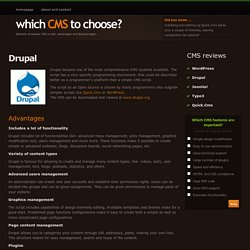
The script has a very specific programming enviroment, that could be described better as a programmer's platform than a simple CMS script. The script as an Open Source is chosen by many programmers who outgrew simpler scripts like Quick.Cms or WordPress.The CMS can be downloaded and viewed at www.drupal.org Advantages Includes a lot of functionality Drupal includes lot of functionalities like: advanced menu management, polls management, graphics modification tool, users management and much more. Variety of content types Drupal is famous for allowing to create and manage many content types, like: videos, polls, user management, text, blogs, podcasts, statistics, and others. Advanced users management An administrator can create new user accounts and establish their permission rights. Graphics management The script includes capabilities of design elements editing. Page content management Plugins Support Disadvantages Compatibility.
Advantages of Custom Module Using CMS For B2B Online Shop. Posted in - Software Development Date - 20 Jan. 2016 2016 is going to be the year of Drupal 8 and Commerce.
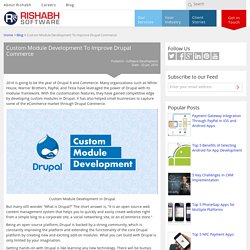
Many organizations such as White House, Warner Brothers, PayPal, and Tesla have leveraged the power of Drupal with its modular framework. With the customization features, they have gained competitive edge by developing custom modules in Drupal. It has also helped small businesses to capture some of the eCommerce market through Drupal Commerce. Custom Module Development in Drupal But many still wonder “What is Drupal?” Being an open source platform, Drupal is backed by a strong community, which is constantly improving the platform and extending the functionality of the core Drupal platform by creating new and exciting add-on modules. Getting hands-on with Drupal is like learning any new technology. Goodie bag module is created in Drupal commerce as goodie bag block.
Goodie bag block contains the following data: Product name with priceTotal bag quantityPrice per bagTotal order. Drupal. An open source CMS which has become popular with a great many people in all corners of the globe.
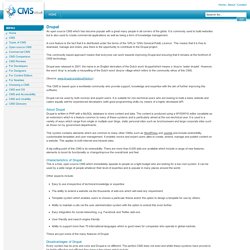
It is commonly used to build websites but is also used to create commercial applications as well as being a form of knowledge management. A core feature is the fact that it is distributed under the terms of the ‘GPL’or ‘GNU General Public Licence’. This means that it is free to download, manage and share, plus there is the opportunity to contribute to the Drupal project. This community based approach means that everyone can work towards improving Drupal and ensuring that it remains at the forefront of CMS technology. Drupal was released in 2001: the name is an English derivation of the Dutch word ‘druppel’which means a ‘drop’or ‘water droplet’. (Source: www.drupal.org/about/history) This CMS is based upon a worldwide community who provide support, knowledge and expertise with the aim of further improving this software.
Drupal: 10 Modules to Optimize Your Drupal Website. Drupal 8 Will Make a Huge Difference in Development for 2015. The Drupal Community is supported by an active and diverse group with more than 1,136,828 Drupalers in 229 countries speaking 180 languages.
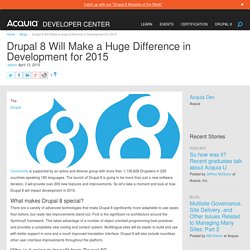
The launch of Drupal 8 is going to be more than just a new software iteration, it will provide over 200 new features and improvements. So let’s take a moment and look at how Drupal 8 will impact development in 2015. What makes Drupal 8 special? There are a variety of advanced technologies that make Drupal 8 significantly more adaptable to use cases than before, but really two improvements stand out. First is the significant re-architecture around the Symfony2 framework.
Who is it going to benefit from Drupal 8? In a nutshell, everyone. Open Source CMS comparison Part 1: Drupal 7. Introduction To allow our readers to choose what CMS is best for their web development projects and applications, we are going to present an overview of some of the most famous and wide used CMSs among bloggers and web developers.
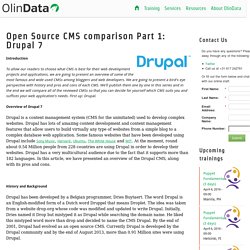
We are going to present a bird’s eye perspective with history and pros and cons of each CMS. We’ll publish them one by one in this series and in the end we will compare all of the reviewed CMSs so that you can decide for yourself which CMS suits you and suffices your web application’s needs.